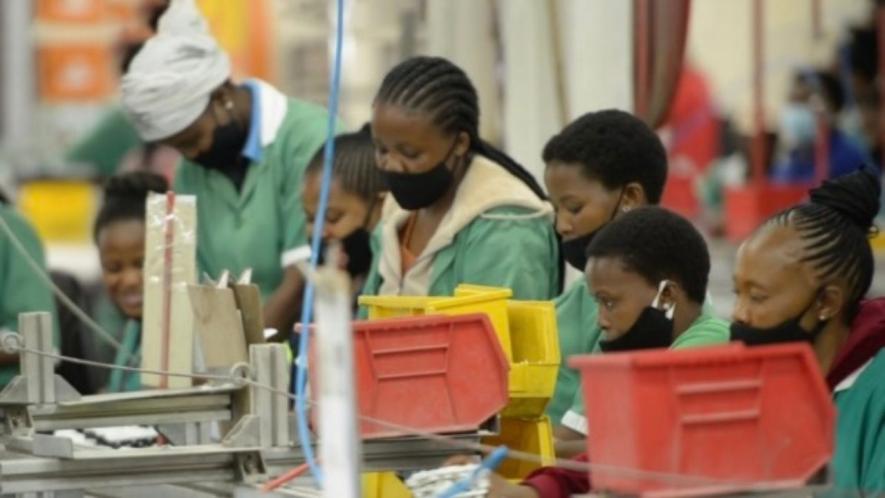Unseen Costs of US Tariffs: the Case of Lesotho

Textile workers in Lesotho. Photo: LNDC
In recent months, the unilateral and illegal tariffs imposed by the Trump administration have garnered much attention. While much of the debate focuses on how these tariffs will impact US consumers and how US allies and adversaries are negotiating “deals”, the concrete impact of these tariffs on the lives and livelihoods of working people in the Global South has been largely overlooked.
In March 2025, US President Donald Trump struggled to pronounce the name Lesotho, a place he claimed “nobody has ever heard of”. One month later, his administration threatened a 50% tariff on all goods from this small, mountainous kingdom of 2.3 million people. These were not claims made out of ignorance; they were an expression of “raw power”.
In this new era, the mediated rules of the World Trade Organization (WTO), though flawed, have been completely disregarded and undermined. What remains is a system where economic policy is used as a weapon. The real cost of a tariff is measured not only in the surrender of sovereignty at the altar of Washington but also in the material deprivation of thousands of people.
The government of Lesotho announced a two-year “state of disaster” in response. A disaster has indeed befallen the Basotho people, but this is not a natural catastrophe. This is a crisis deliberately created in Washington, the violent outcome of a 150-year process that systematically eroded Lesotho’s economic sovereignty. To understand the full scale of this disaster, one must first dispel the colonial myth that African “development” depends on Western benevolence.
Britain’s colonial subordination of the Basotho people
Before British rule was formalized in 1868, the Kingdom of the Basotho was a regional breadbasket. It was so productive that it was called “the granary of the Free State”. Basotho farmers produced large surpluses of grain, wool, and mohair, exporting 100,000 bags of grain in 1873 alone. This economic strength laid the groundwork for their political independence – an independence that colonial capitalism could not tolerate.
The discovery of diamonds and gold in South Africa sparked an insatiable demand for cheap labor. To undermine the self-sufficiency of the Basotho people and force them into the socially destructive migrant labor system that underpinned colonial capitalism in South Africa, the British colonial administration used a powerful tool: the Hut Tax.
This tax, payable only in cash, was a deliberate act of social engineering designed to sever producers from their means of production. To comply with this cruel demand, Basotho men had no alternative but to abandon their farms and sell their labor to the white-owned mines in South Africa. This policy systematically dismantled the country’s agricultural foundation, turning a once-prosperous population into a dependent labor reserve economy.
Colonial patterns persist
This pattern of dependency persists. Mining jobs for Basotho people declined in the 1990s, following South Africa’s democratic breakthrough, which was followed by an overall decline in mining and a focus on South African labor over regional labor. Basotho miners, once a key part of the region’s economy, became economically redundant.
Global capital simply redirected its focus to a new, cheaper labor source: Basotho women. The growth of the textile industry, where women earned poverty wages ranging from USD 138 to USD 155 per month, facilitated by preferential trade agreements, was not a break from the colonial past but a direct continuation of the labor reserve model.
The foundation of this neocolonial structure has been the US African Growth and Opportunity Act (AGOA). By providing duty-free access to the US market, the AGOA has driven remarkable growth in Lesotho’s textile sector, which employed around 40,000 workers, nearly all of whom were women. However, this growth was a poisoned chalice, rendering the country’s entire manufacturing base utterly dependent on Washington’s political whims. AGOA was never intended to promote genuine industrialization; it aimed to establish captive, low-wage assembly platforms for US capital.
The crisis in Lesotho exemplifies the broader struggle between US-led imperialism and the Global South.
The way forward
The path to liberation does not lie in negotiating better terms of dependency but in creating an alternative. The most vital strategic focus for African nations must be the African Continental Free Trade Area (AfCFTA). However, this should not become a “mercantilist” race to the bottom, where countries compete to export the most raw materials or basic textiles to fellow African nations.
This approach would only perpetuate the existing economic hierarchy. Instead, the focus should be on developing complementary industries that produce finished goods within the continent, thereby capturing a greater share of the value chain. The goal should be cooperative regional integration to improve collective industrial capacity and promote mutual prosperity.
While the ongoing, US-supported genocide in Palestine serves as the pivot around which the liberal order of “human rights” is collapsing, the persistent economic coercion of the Global South by the Trump administration similarly highlights the collapse of the liberal idea of a “rules-based international order”. The actual cost of the US tariffs is the neocolonial subjugation and a return to overt, unabashed imperialism.
The response to this crisis must not be surrender, but rather the construction of a sovereign path through Pan African unity and regional economic integration. True independence will not be bestowed in the boardrooms of Washington. It will be achieved on the streets and in factories through the organized, collective power of the African people.
Jonis Ghedi-Alasow is the Coordinator of the Pan Africanism Today Secretariat.
Courtesy: Peoples Dispatch
Get the latest reports & analysis with people's perspective on Protests, movements & deep analytical videos, discussions of the current affairs in your Telegram app. Subscribe to NewsClick's Telegram channel & get Real-Time updates on stories, as they get published on our website.
























